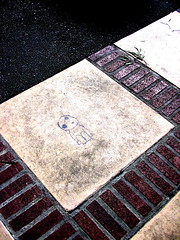Buying and selling reality
Read anything about the market for virtual land recently? The IRS has. Virtual markets are here to stay.
I don't know if those folks realize how much potential the thing they've invented has, but the Networking Working Group sure has.
------------------------
Bidding down the specie market
Raising up the market in time
:
Make time stop.
Cash in your Dollars for Squidgets.
Jo Guldi, Brian Sarrazin and the Networking Working Group
March 2006
Capitalism has a problem, but it’s not the market. Markets create efficiency, discourse, competition, and dialogue. Old world markets are the one sit where lepers, women, immigrants, prostitutes, burghers, and priests all vend their wares, subject only to the will of the masses. The problem with capitalism isn’t the market; it’s the market of specie.
The specie market can bid against other markets: the individual time market, the community values market, the market in ideas, the war and peace market. If specie is running high (as it is in America today), someone with a lot of currency can outbid someone with a lot of time. They can outbid the media, the ideas market, the war market, and the community values market.
Where human, individual time has a high currency value, no amount of currency can buy a man’s entire day. Time is to be cherished and valued for itself, saved up; spent only on something of incomparable value.
The problem in America today is that specie is liquid but time and values aren’t. One solution is a violent overthrow of all financial and political institutions, and a retreat into a centralized authority or rejection of all authority; both tend to be inherently unstable, repressive, and violent.
Another solution is to bulk up the currency of one institution. Bulk up how much people value the respect of their immediate community. Give them something they can show for it: my neighbors and local taquerieas think I’m a charitable, loving person; I have a badge. People do things for the love of their neighbors. They do things actively and assertively because it gives them the respect of others. Make community value or time or ideas visible, and watch people flood in to bargain for them.
History is changing the flexibility of the market. Gamers spend thousands of dollars for mythic swords that only exist on the screen. The IRS started asking about what’s actually being traded in folks’ tax accounts. The market is suddenly flexible, and will allow us to trade anything we think could exist. Now is the time to invent markets that could compete with specie. Now is the time to make sure that specie becomes devalued in comparison with time, ideas, and community.
The trade in squidgets could devalue the dollar compared with time, ideas, and community as never before.
Squidgets originated in a caffeinated Berkeley conversation about the problematic irrelevance of so much volunteer activity – how isolated it is, how little one has to show for it, how much one has to make time for it and rework one’s life to contribute even a little. Students spend hours on myspace because they value the praise of their community, but volunteering is hard because it’s so distant, so relevant, and so hard to plug into from the busy stream of daily chores.
The solution is wildcat banking of squidgets. The little hip girl who bakes the cake for the activist tent revival gets five squidgets for her work. A ticker on her blog shows her friends how cool she is for earning the squidgets. All she had to do was show up to the event and give them something. She feels good about working with them; she feels like her friends value what she does.
Squidgets are traded against dollars. The philanthropist who favors the activities of the tent revival buys squidgets for dollars. The organizer who worked a year at forty hours a week gets $40,000 for her 40,000 squidgets. Fiona, who baked a cake for the ten revival, might be able to cash in her five squidgets for a latte at the community-oriented coffee shop, where the owner used to give free coffee to other activists Fiona’s never been there. Now she’s immediately known by others in the squidget market, by virtue of owning squidgets. People want to know, where is it she got her squidgets from? Does she like working with them? What did they talk about, do, organize, plan, notice at the tent revival?
Squidgets are competive. Red Cross squidgets can be bought and sold against LGBT student center squidgets on the open market. If society values the Red Cross, the Red Cross Squidget sells for more; if, in Berkeley, members of a co-op prefer the LGBT association’s work against AIDS to that of the Red Cross, the Red Cross Squidget may become very devalued indeed. Squidgets reflect the values of the society in which they’re bought and sold.
Squidgets are organic and egalitarian. Anyone can start minting Squidgets. Maria started minting the Maria Squidget yesterday because she and a few neighbors wanted to thank the folks showing up to the soup kitchen. If Maria can log onto E-Bay, she can mint and distribute Squidgets.
Squidgets are self-correcting as well If holders of the Maria Squidget notice too many Maria Squidgets on the market because Maria payed the soup kitchen shelf several billion Maria Squidgets for his labor, they can bid out of the Maria Squidget before it devalues.
Squidgets inherently privilege civic interactions that promote the long-term good in favor of future generations. The Bob Squidget rises against the Maria Squidget only if folks in the neighborhood believe that Bob’s work is more meaningful, of a higher quality, and more likely to last than Maria’s. If Bob rebuilds New Orleans, the Bob Squidget rises because folks believe that Bob’s work in New Orleans will matter and pay off in one hundred years.
The purpose of Squidgets is to increase the visibility, liquidity, and veneration of individual time and community values. Squidgets compete with the dollar, and where Squidgets are bid against dollars, the importance of community service, long-term planning, and neighborhood esteem bids up against the value of the pure monetary economy.
Technorati Tags: squidget, market, freemarket, libertarian,
liquidity, charity, value, stocks,
activism, networks, society, money
 In the Lower Ninth Ward of New Orleans, Demond Mullins, who returned from heavy combat in Iraq only five months ago, looked out at the ravaged, filthy wreckage in a quiet furry.
In the Lower Ninth Ward of New Orleans, Demond Mullins, who returned from heavy combat in Iraq only five months ago, looked out at the ravaged, filthy wreckage in a quiet furry. 

 Maybe it was the implosion of leadership at Harvard last month, maybe it was the shooting of the progressive Christian peacemaker in Baghdad, maybe the Civil War over there, maybe the fall out of Dick Cheney's shooting with exculpation. Bizarre collapses of institutions seem to be happening so often these days that you just get used to it. If you're in your twenties and thirties, maybe you just assume that growing up means learning to tolerate institutional incompetence and get on with your job. But when your parents and elders reach the same pitch of surprise, the speculation starts.
Maybe it was the implosion of leadership at Harvard last month, maybe it was the shooting of the progressive Christian peacemaker in Baghdad, maybe the Civil War over there, maybe the fall out of Dick Cheney's shooting with exculpation. Bizarre collapses of institutions seem to be happening so often these days that you just get used to it. If you're in your twenties and thirties, maybe you just assume that growing up means learning to tolerate institutional incompetence and get on with your job. But when your parents and elders reach the same pitch of surprise, the speculation starts. 













